Sharing data between departments is sent with enterprise software solutions. Enterprises can streamline their operations and better serve their customers.
These solutions help businesses access and communicate vital information across the company, giving executives a window into how things are running in real time. Let’s read to see what they can do for organizations.
The meaning of enterprise software solutions
Firm solutions are software programs tailored to a large firm’s requirements instead of those of a single user or a small company.
By their very nature as vast organizations with numerous departments and areas of expertise, enterprises suffer several difficulties not shared by smaller businesses.
Businesses can improve their performance by utilizing it to help them face and conquer these obstacles.
In general, an enterprise solution is a type of software application specifically created to address the complex requirements of an organization rather than catering to the needs of an individual or a small business.
Large organizations often encounter specific challenges with their wide range of operations. These challenges can include difficulties in communication between different departments and navigating the complexities of international commerce.
Using this method can benefit a company as it helps them tackle these challenges and ultimately enhance their overall performance.

Enterprise solutions often involve the integration of multiple systems within an organization. This integration allows for the sharing and exchanging of information between different databases, which can help make business processes more efficient and improve workflows.
They can accommodate professionals in the business world who have to handle various tasks across different departments in their organization. For instance, a compliance officer might need to access the systems of every department within a company.
What are some advantages of enterprise solutions?
There are numerous benefits for businesses seeking to enhance their operations and gain a competitive advantage in their respective industry. These solutions have a significant benefit in that they assist businesses in making their workflows more efficient and streamlined.
They can be beneficial for businesses. They automate repetitive tasks and give enterprises a central platform to manage complex operations. This saves businesses time and resources, which they can use to focus on more important strategic initiatives.
This is an added benefit of enabling businesses to make data-based decisions. They offer a complete overview of a business’s operations and performance. They help companies pinpoint areas needing improvement, enhance performance, and make well-informed decisions. This, in turn, can result in higher revenue and overall growth.
These business solutions are beneficial because they enhance teamwork and communication among different teams. Plus it can be constructive for businesses.
They offer a centralized platform where you can manage projects, share information, and communicate with your team members. This can improve productivity and ensure everyone is on the same page and working towards the same goals.
When businesses implement this method, it can benefit them by improving their operations, boosting productivity, and giving them a competitive edge in their industry.
A dynamic platform for growth and innovation is provided by this technique that may be easily integrated with your current processes.
The characteristics of modern enterprise software solutions are decentralization, autonomy, autonomy in funding and management, and so on.
Types of enterprise solutions
As we understood, enterprise software is a term used to describe businesses’ applications to handle their complex operations. These operations include accounting, customer relationship management (CRM), human resources (HR), and supply chain management.
Selecting the appropriate enterprise software is crucial for a business to thrive since it aids in streamlining workflows and enhancing efficiency.
Given the wide range of options available in the market, it can be challenging to figure out which type best fits your business needs. So, we’ve compiled a list of the top 5 types to assist you in making a well-informed choice.
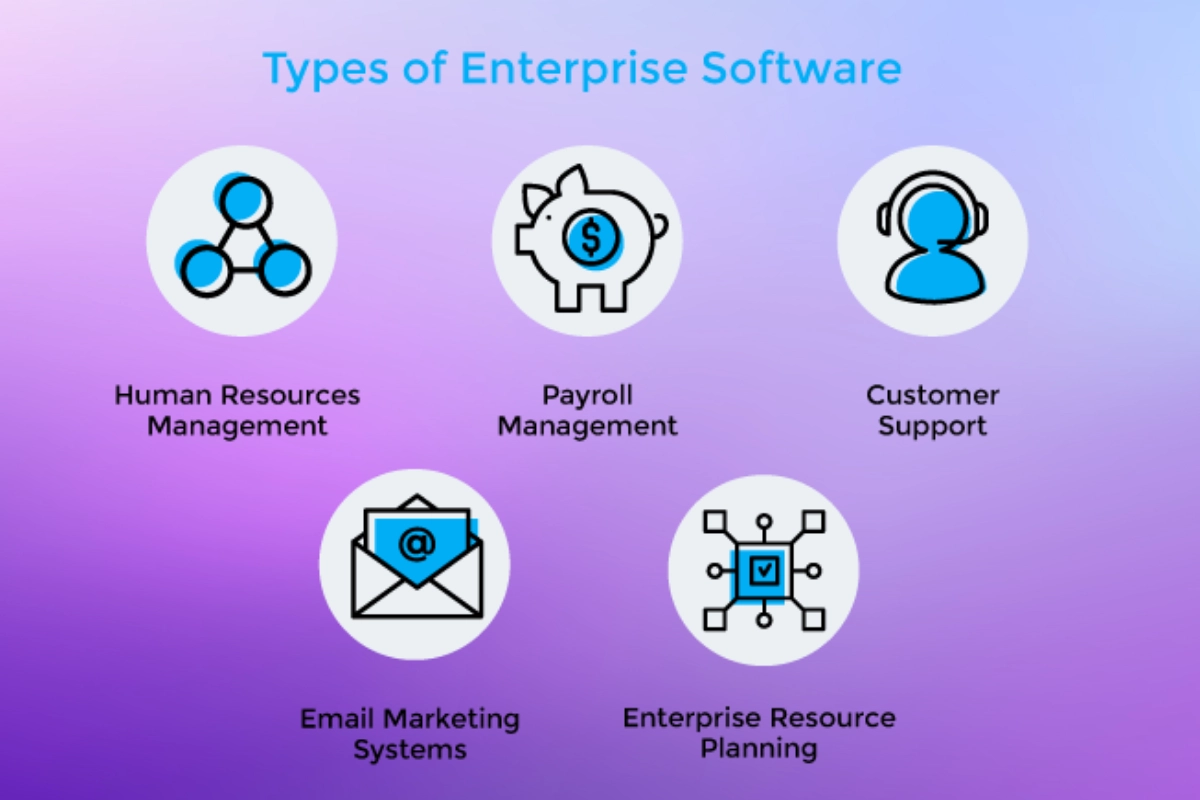
Today’s fast-paced digital environment requires businesses to have a range of essential enterprise software applications. These include ERP and CRM systems, HR management tools, and data analytics software.
1. ERP Software:
ERP software is a tool that businesses use to manage various activities and facilitate the smooth data flow between them. It helps in organizing and coordinating different processes within an enterprise.
The main goal of this system is to make things easier and more efficient by automating and streamlining processes. This will help us make the best use of our resources.
However, to fully benefit from this software, companies must choose the right ERP software from the numerous available options, which can be challenging.
Every organization has its unique products or services. The standard features of an ERP system may or may not meet the specific needs of your business.
This means that companies need to choose an ERP platform that has features that align with their company goals. Companies should customize their ERP software to align with their specific business model.
By opting for a custom ERP solution, companies can experience improvements in productivity and efficiency, gain a competitive edge, and generate a high return on investment.

2. CRM Software
CRM is an acronym that stands for customer relationship management. CRM software is a type of software that is driven by data and helps companies manage and nurture their relationships with customers.
Customers are the actual value of any organization. CRM is a tool that you definitely should pay attention to.
It’s worth mentioning that many CRM software options in the market come with unnecessary and irrelevant functionalities. This means that companies using pre-made CRM systems have to pay a lot for features they don’t even need.
Additionally, companies need to buy extra add-ons to make the software work with their CRM system, which can be expensive.
Instead, opting for a custom CRM system might be a great solution. Companies can use custom CRM software to remove any features they don’t need and focus on building the specific features necessary for their organization.
It seamlessly integrates with your current platforms because it is specifically designed to be customized for your needs.
3. Project Management Software
Managing project tasks, including planning, organizing, streamlining, tracking, controlling, and meeting deadlines, can be overwhelming. Project management software is helpful in this situation.
Project management software is essential, regardless of the company’s size.
Project management software is created to assist businesses in improving their ability to plan, organize, and manage projects more efficiently.
The platform allows project managers to easily keep track of progress, assign tasks, and work with team members. Project management software is a helpful tool for businesses.
It allows them to understand their projects better, make the most efficient use of resources, and ensure that projects are finished on schedule and within the allocated budget.
There are many project management software options available that offer a variety of features. These features include tracking tasks, keeping track of time, managing budgets, and generating reports. In addition, specific platforms can connect with other software applications like CRM or accounting software.
This allows for a more complete understanding of project performance by providing a broader range of information.
Companies will create customized workflows that align perfectly with their specific needs and fully adhere to their established processes by using the appropriate project management or even Bespoke software.
This all-in-one platform enables companies to achieve increased sales and higher profit margins. Is this sufficient to gain a competitive edge in the market?

4. Marketing Automation Software
Marketing automation software handles repetitive marketing tasks, like sending emails, posting on social media, and nurturing potential customers. It helps businesses make their marketing efforts more efficient by automating tasks that take time and resources.
Marketing automation software is a tool that businesses can use to make their marketing messages more personalized. It also allows them to divide their audiences into different groups based on demographics or behavior.
Additionally, it helps businesses track and analyze their marketing campaigns’ effectiveness.
Marketing automation solutions come with various features that can be helpful for businesses. These features include lead scoring, A/B testing, and analytics.
They can help businesses improve and optimize their marketing strategies. In addition, specific platforms also can connect with other software applications like CRM or sales software.
This allows for a more complete understanding of customer engagement and helps to enhance the coordination between marketing and sales teams.
Businesses can use the appropriate marketing automation software to enhance their lead-generation strategies, boost customer engagement, and ultimately generate more revenue.
5. Enterprise Business Intelligence Software
Enterprise Business Intelligence (BI) software businesses use to gather, analyze, and present large amounts of data.
This helps them understand the information better and make smarter decisions for their business.
This platform allows businesses to combine data from databases, spreadsheets, and cloud applications. By doing so, they can generate reports, dashboards, and visualizations that help them spot trends and patterns.
Enterprise BI software is designed to give businesses a complete picture of how they’re doing.
It helps them find areas to improve, make their performance more efficient, and make data-based decisions.
The software provides various features like data mining, visualization, and predictive analytics. These features assist businesses in understanding their data and gaining valuable insights that can be used to shape their business strategies.
These solutions can often integrate with other software applications, like CRM or ERP systems.
This integration allows for a more complete and holistic understanding of business performance. By utilizing the appropriate Enterprise BI software, businesses can enhance their decision-making abilities, boost operational efficiency, and gain a competitive edge.
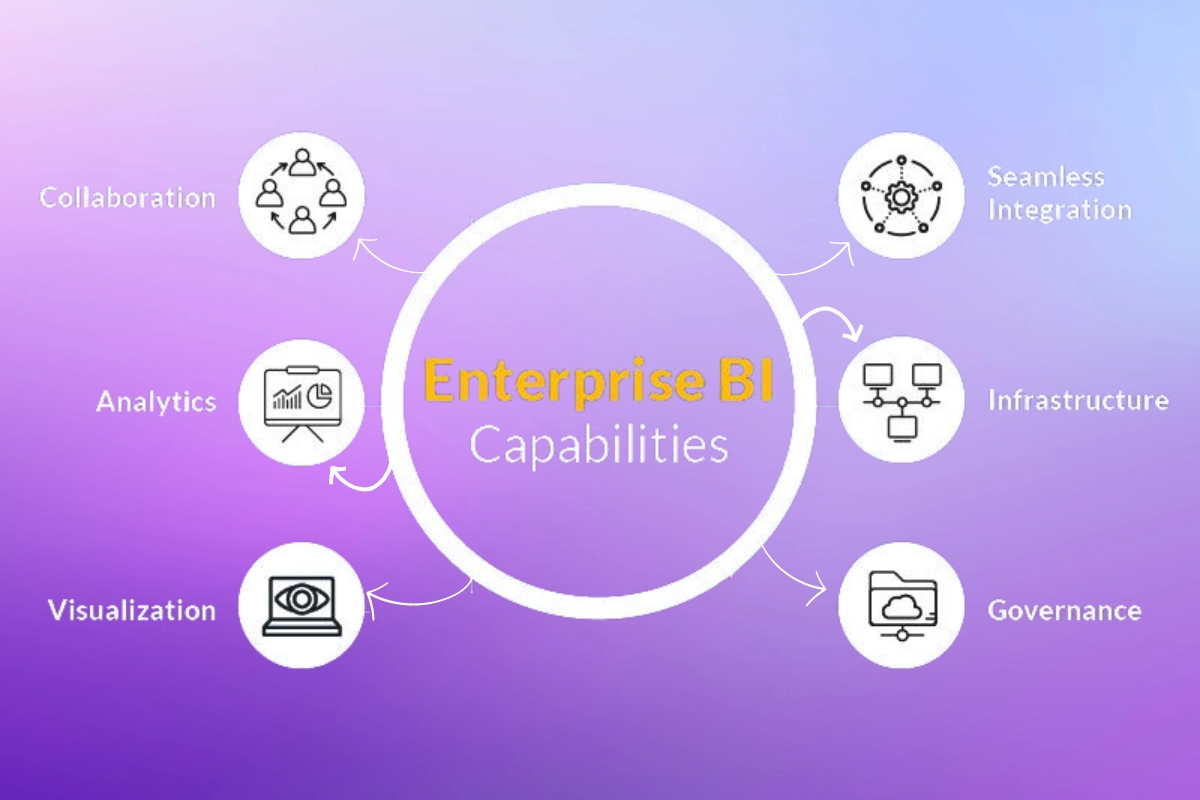
What factors should you consider when selecting enterprise application software for your business?
Enterprise software is prevalent and influential these days. It can bring many benefits and conveniences to your company, but only if you choose the right one.
All right, let us guide you on how to select the perfect one that aligns with your specific business requirements:
- Conduct Market Research
To begin selecting enterprise software, it’s essential to start with thorough market research. This involves looking into the current popular options, understanding their benefits, and assessing how well they align with your company’s goals and objectives. It’s also crucial to consider how these software solutions can address your business’s specific challenges. To gain a thorough understanding of the market situation, you should consider seeking answers to the following questions:
- What issues currently affect your business, and what solutions are you considering to address them?
- Which operational processes are crucial for your organization?
- Is it possible to improve any of these processes using this specific method?
- Are there any challenges that you encounter in your day-to-day business operations?
- Is it possible for an enterprise software solution to solve these problems?
- Document Your Requirements
Now, it’s time to write down your strategy. And make sure to thoroughly document all the features and requirements you want to incorporate into your enterprise software.
It would be helpful to support your choices with relevant research. Once you have decided on your enterprise software solution’s appearance and overall experience, the development process will become much more straightforward.
- Careful budgeting
Then, analyze the available enterprise software solutions, evaluate what they offer, compare their prices, and establish a budget for your specific plan.
Consider customized solutions if you can’t find a ready-made enterprise application that fulfils all your business requirements.
A bespoke enterprise solution is a software application built specifically for your business needs.
It is customized to fit your requirements perfectly. When you collaborate with a software development team, they can help you create a solution specifically tailored to your needs. Instead of trying to adapt your business processes to a pre-made application, you can have a software solution designed to fit your unique requirements.
But it is best to consider that it require more time and money than ready-made applications. They offer substantial advantages in improved efficiency, productivity, and competitiveness.

Why It’s Better To Develop Your Own Bespoke Enterprise Software?
Creating your customized enterprise software can provide various advantages for your business. There are several reasons why you should consider developing your software.
- Customization:
Sometimes, pre-made software only fulfills some of the specific needs of your business. When you develop your custom software, you can create a solution that perfectly fits your requirements. This means it will work seamlessly with your business processes and workflows.
- Competitive advantages:
Creating your custom software can give you a competitive edge in your industry. A custom-built solution for your business sets you apart from competitors and gives you exceptional features you won’t find in ready-made software.
- Scalability:
Scalability is an essential aspect of bespoke enterprise software. It allows the software to adapt and expand with your business as its needs change. Using this approach can help guarantee that your software solution remains aligned with your business needs as your business grows.
- Integration:
When you develop your custom software, you have the advantage of being able to integrate it with your current systems and processes seamlessly. Streamlining workflows and eliminating the need for manual data can significantly enhance efficiency and productivity.
- Ownership;
You own the intellectual property and source code when you develop your custom software. This means you have control over the development and maintenance of the solution.
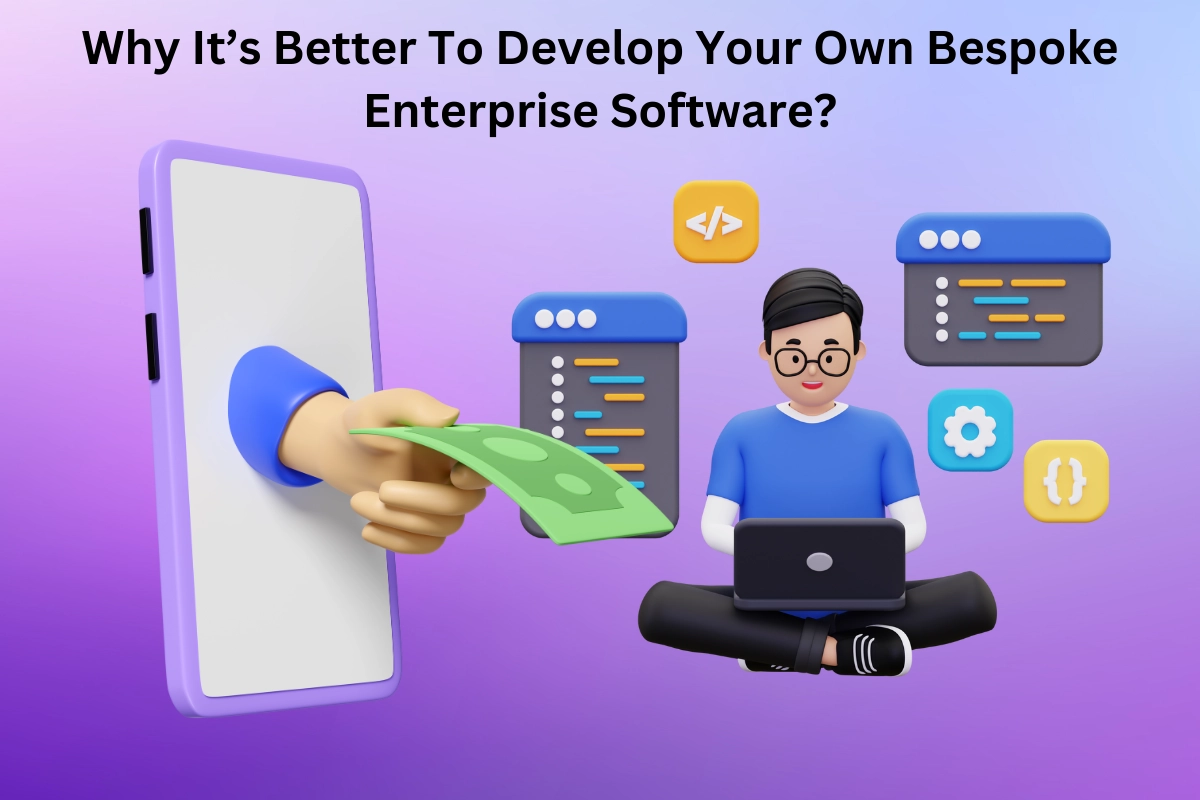
Developing may take time and resources but it offers several advantages. It allows you to tailor the software to your needs, giving you a competitive edge. It also allows for easy scalability and integration with other systems. Additionally, you have full ownership and control over the software.
frequently asked questions
Enterprise solutions are created to bring together different parts of a company’s business by sharing information between different areas and databases.
Microsoft offers support for several popular enterprise system software applications, including Microsoft Teams, Office 365, Outlook, and Skype. These enterprise applications work together to help employees in a business communicate and share important customer data and information across different departments.
conclusion
In today’s modern business environment, investing in enterprise software solutions is crucial for companies to enhance operations, boost productivity, and achieve business goals.
Off-the-shelf software and custom-made enterprise solutions offer efficiency and productivity gains that can be advantageous for businesses.
While off-the-shelf solutions have advantages, bespoke solutions offer a personalized approach that caters to specific business requirements.
By investing in it, businesses can effectively handle intricate operations and stay ahead of the competition.
In summary, businesses need to enhance their operations and gain a competitive edge. Whether companies choose off-the-shelf or bespoke enterprise solutions, investing in these solutions can help businesses boost productivity and reach their business goals.
We would be delighted to hear from you if you require bespoke services. Please don’t hesitate to contact us; we will do our best to assist you.



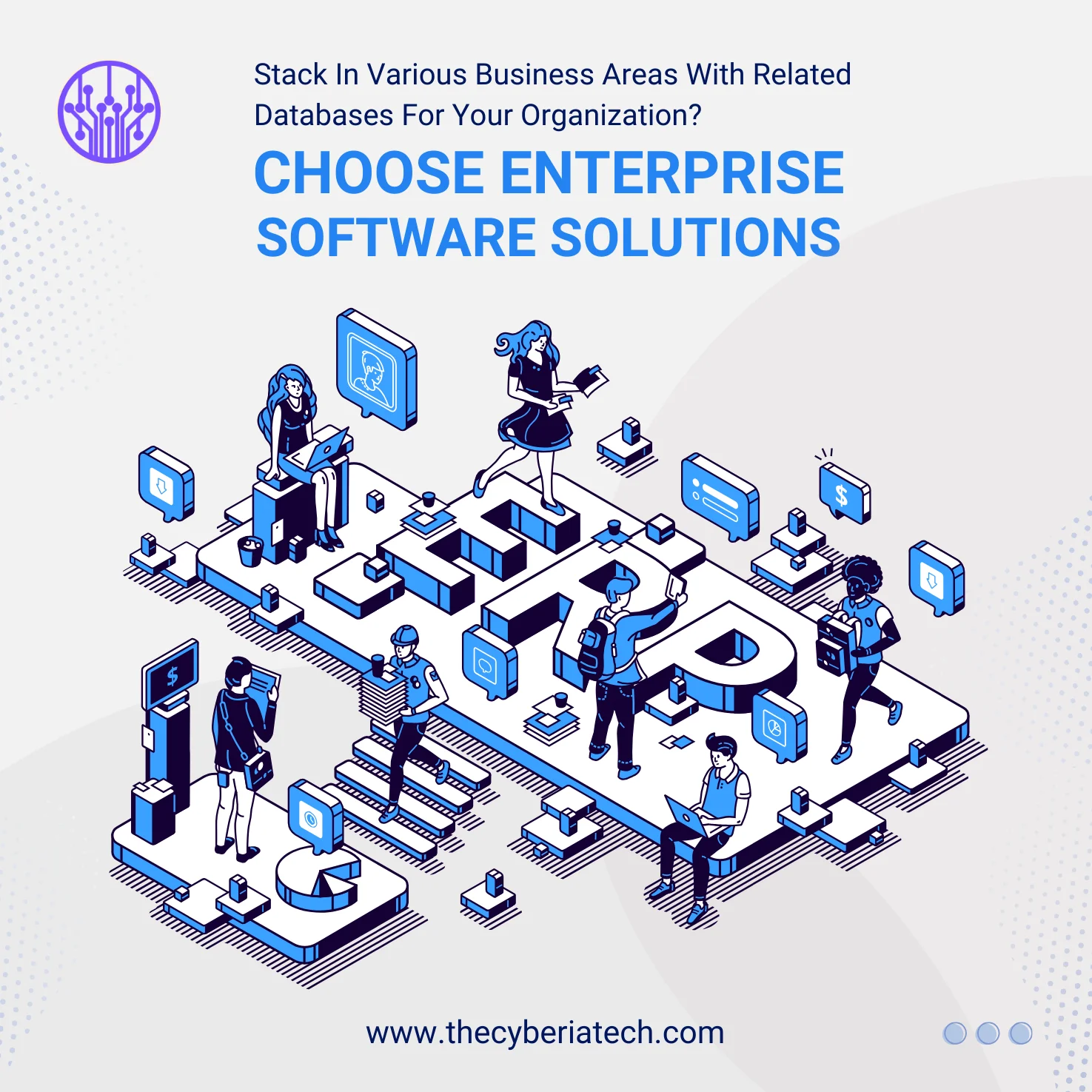
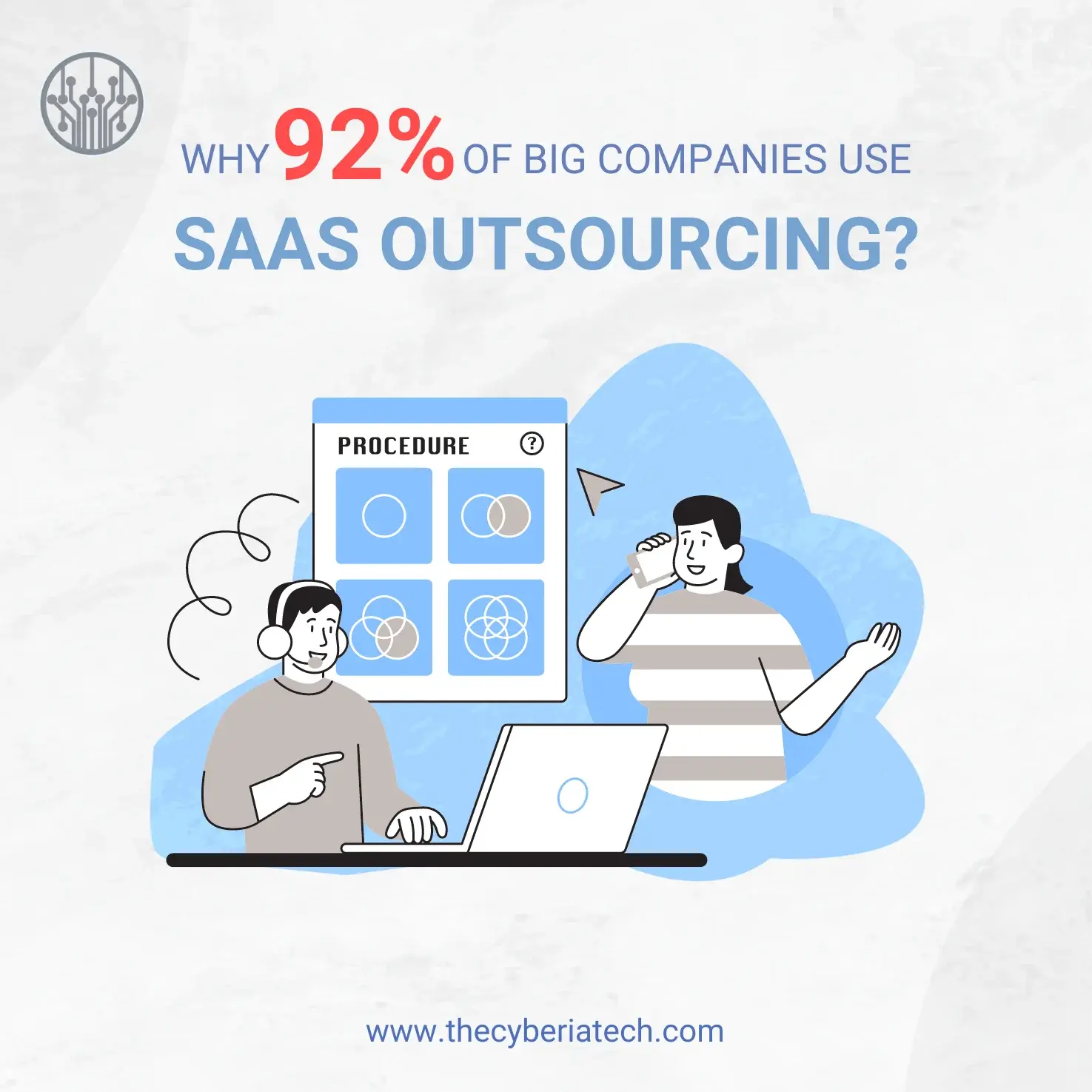



2 Responses
I just read your article and found it to be informative and well-written. It’s great to learn about the benefits of using these solutions to help large organisations tackle complex challenges and improve their overall performance.
I’m curious, though – what are some of the potential drawbacks or challenges that companies might face when implementing enterprise solutions? I imagine that it can be a complicated process, especially for larger organisations with multiple departments and systems to integrate.
Great question! Implementing enterprise software solutions in a large organisation can undoubtedly be a complex process with potential drawbacks and challenges.
Some of the most common challenges include high implementation costs, resistance to change among employees, integration issues, security concerns, the need for extensive training and support, ongoing maintenance and updates, and compatibility issues with existing hardware or software.
co
However, with careful planning and execution, these challenges can be overcome, and the benefits of enterprise solutions can far outweigh the costs and effort involved in their implementation.
Thank you for your interest in this topic, and I hope this helps provide some insight into the potential challenges and benefits of using enterprise software solutions in a large organisation.